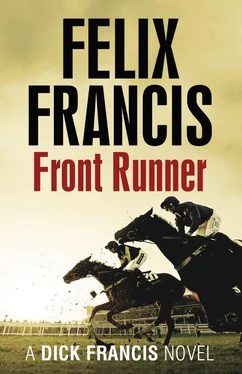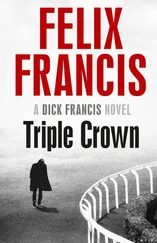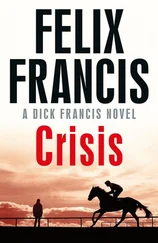‘But you’re meant to be resting and recovering, not working.’
‘I only want to go and speak with him,’ I said. ‘I’m not going to chase him anywhere.’
At least, I hoped not.
‘Where does he live?’ Faye asked.
‘Raynes Park.’
‘I’ll drive you, if you like,’ she said. ‘I’m not doing anything else.’
My first instinct was to say no. My work was my work and my family was my family. I didn’t mix the two. Largely because Faye would not have approved of everything I did in my work. However, the way things had been going recently, I thought it could be reassuring to have someone waiting for me outside when I went in to see Leslie Morris.
‘OK,’ I said. ‘That would be great.’
To say that Leslie Morris was not pleased to see me would be an understatement. As I introduced myself as a BHA investigator, he tried to close his front door but I had my foot against the frame, preventing it.
‘Move your foot,’ he demanded through the six-inch gap.
I didn’t budge. ‘No.’
‘What do you want?’ he asked, without releasing the pressure on the door.
‘I want to talk to you about Bill McKenzie’s riding of Wisden Wonder at Sandown.’
He didn’t ask me what it was about Bill McKenzie’s riding that I was interested in. He knew.
‘I don’t want to talk to you,’ he said. ‘Now, remove your foot.’
I still didn’t budge.
‘Aggravated trespass is against the law,’ he said.
‘So is defrauding the betting public,’ I replied.
There was no response other than an increased pressure on the door.
‘You’ll have to talk about it sometime,’ I said. ‘Or shall I pass the file over to the police? The Fraud Squad won’t just put their foot in your door, Mr Morris, they will break it down, and then they’ll arrest you. Is that what you want? Do you fancy a cold night in the cells sharing with some drug addicts?’
He was rattled. I could see it in his eyes.
‘Mr Morris,’ I said. ‘This is your last chance. Either you let me in now or you had better go and pack your toothbrush ready for the arrival of the boys in blue. It’s your choice.’
I was pretty sure that the police would not be sufficiently interested to come hotfoot to his door with an arrest warrant, and they certainly wouldn’t have put him in a cell with anyone else, but was Leslie Morris prepared to take the risk?
Obviously not, as he slowly opened the door wide.
‘Who is that?’ he asked, looking over my shoulder towards Faye, who was sitting in the car parked on his driveway.
‘My assistant,’ I said. ‘She’ll wait there for me.’
He led me through to the kitchen.
‘Now, what is all this about?’ he asked, nervously pushing his fingers through his white hair while trying his best to exude an air of innocence.
‘How well do you know Bill McKenzie?’ I asked.
Again, movement in his eyes indicated a rising degree of concern.
‘I’ve heard of him,’ Morris replied. ‘I’ve seen him riding, of course, but I don’t know him personally.’
‘That’s strange, because he seems to know you.’
More concern.
‘I can’t think how,’ Morris said. ‘I don’t believe he’s ever ridden my horse.’
I’d already checked for that in the BHA records.
‘Tell me about the bets you made at Sandown Park races on the Friday of the Tingle Creek meeting,’ I said, changing tactics.
There was a distinct tightening of the muscles around his eyes and his breathing became shallower, sure signs that his rising concern was nearing the slide into panic.
‘I don’t know what you’re talking about,’ he replied, trying his best to control his breathing.
‘You made multiple bets on the race where Wisden Wonder was the favourite.’
‘I think you must be mistaken,’ he said.
I took my iPhone out of my pocket and showed him one of the photographs I had taken on that day at Sandown. It clearly showed him in his distinctive blue fedora handing over a substantial wad of cash to a bookmaker. In the background, plainly discernible, was a bookie’s brightly lit price-board showing the names of the eight horses in the race including Wisden Wonder, offered at six-to-four.
‘I am not mistaken,’ I said slowly. ‘You made over thirty large bets on that race. I watched and filmed you.’
I looked around, hoping that his little red notebook in which he’d recorded his bets would be conveniently lying on the kitchen worktop. No such luck.
‘But not a single one of your bets was on the favourite,’ I said. ‘Why was that?’
Now he was really anxious. He showed all the signs of increased adrenalin in his system — wider pupils, bunched muscles, rapid breathing. His body was ready for fight or flight, but his mind was still in control.
‘I obviously didn’t think the favourite would win,’ he said calmly. ‘And it wasn’t good value at such a short price.’
‘I think you are lying to me, Mr Morris. I think you knew that Wisden Wonder wouldn’t win because you had paid Bill McKenzie to ensure it didn’t. Then you backed every other horse in the race knowing that, whichever of them won, you would make a handsome profit.’
He said nothing.
‘Whose money did you use?’ I asked.
He looked slightly baffled by the question. ‘What do you mean?’
‘I calculated that you wagered nearly seventeen thousand pounds on that race. Where did you get that sort of cash?’
He seemed genuinely surprised that I knew the amount.
‘It was my money,’ he said.
I looked around me again. Mr Leslie Morris may have lived in a fairly sought-after part of London suburbia, yet there was nothing about his house or its contents that indicated he would have had seventeen thousand pounds in readies lying around spare to wager on the horses.
The original covert tip-off had indicated that he was placing bets for an excluded person.
‘I don’t believe you,’ I said. ‘Who’s your banker?’
‘I tell you, it’s all my own money,’ he said again with more confidence. ‘I used the lump sum from my pension fund.’
‘How did you know that Wisden Wonder wasn’t going to win?’
‘I didn’t,’ he said.
‘Don’t give me that nonsense,’ I said with annoyance. ‘You and I both know you wouldn’t risk your pension money unless you knew for certain that the horse wouldn’t win. Do you take me for an idiot or something?’
He said nothing.
‘So how did you know that, Mr Morris? How much did you pay Bill McKenzie to make sure he didn’t win?’
He still made no reply.
‘Saying nothing won’t help you at the disciplinary panel,’ I said. ‘Your racing days would be over for good.’
Disqualification as an owner, and exclusion from racing premises for a minimum of ten years was the least he could expect, maybe even for longer. Racing and the BHA were not very good at forgiveness, even for those who admitted their guilt and helped to implicate others.
‘Did you know Dave Swinton?’ I asked.
Full-blown panic now appeared in his eyes.
‘I met him once,’ he said, his voice sounding higher in pitch owing to the tightening of the muscles in his neck. ‘He rode my horse at Ludlow last May.’
I’d also checked that on the BHA database, and he would have known it.
‘His death is such a terrible loss for racing. I liked him.’
‘Did you know him professionally?’ I asked.
‘And what do you mean by that?’ he said, regaining some of his confidence.
‘Were you his accountant?’
‘No,’ he said. ‘I was not.’
‘I’ll check, you know,’ I said.
‘Check away,’ he replied. ‘I worked for a small three-man outfit here in Wimbledon. I’m sure the likes of Dave Swinton would be represented by one of the big London firms.’
Читать дальше












